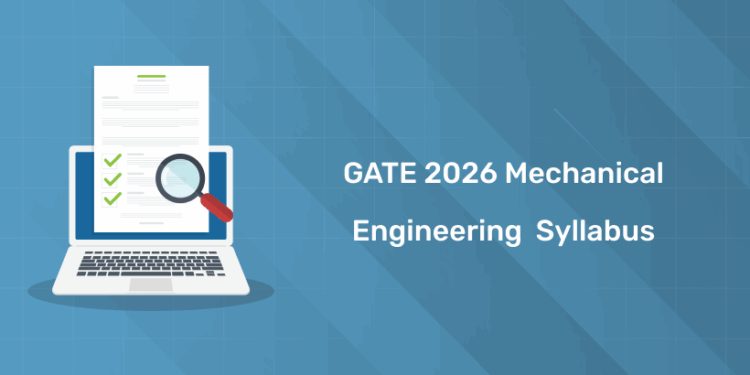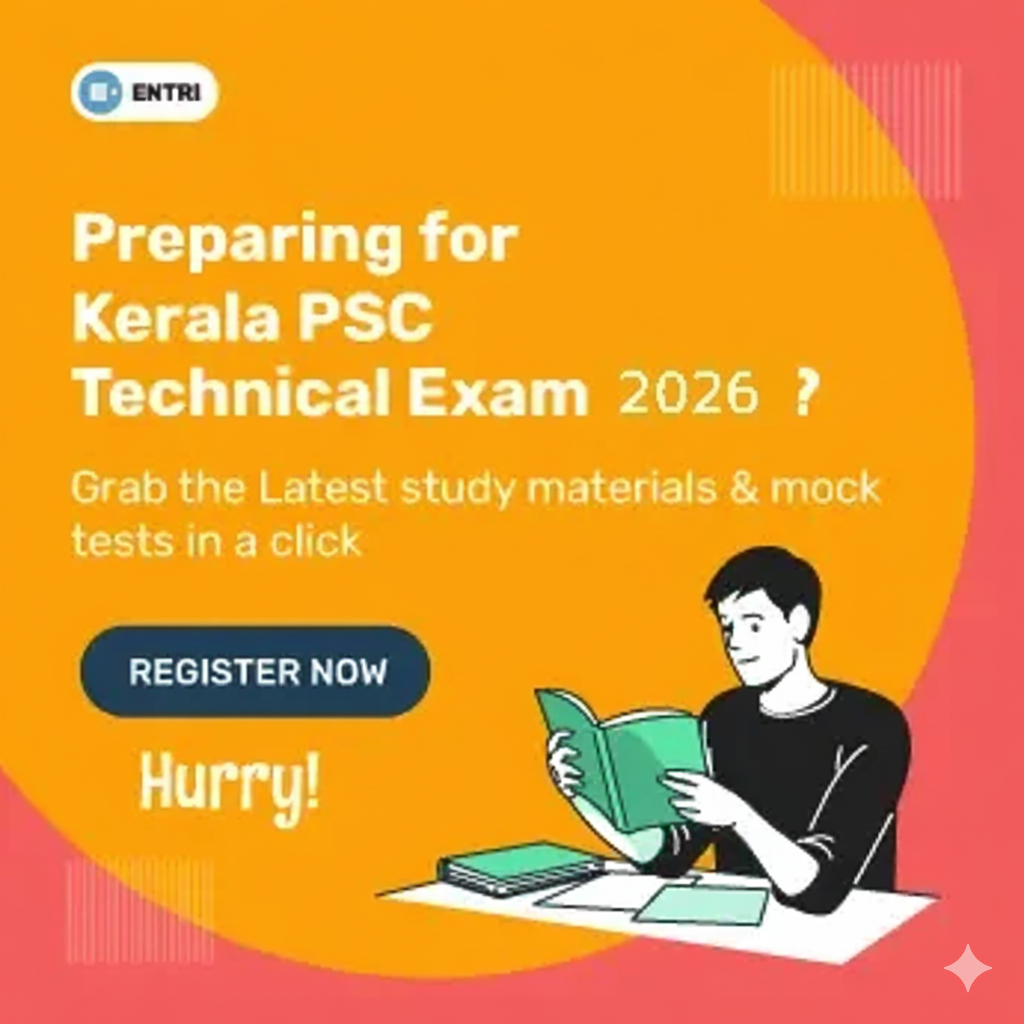Table of Contents
GATE 2026 exam is expected to be announced soon, and it’s the right time to begin your preparation with the latest syllabus. In this blog, we’ve shared the complete GATE 2026 Mechanical Engineering syllabus along with the updated exam pattern. From core topics to marking schemes, everything you need to know is covered here. Download the official PDF and start planning your study strategy today!
GATE 2026 Notification Overview
| Particulars | Details |
|---|---|
| Exam Name | GATE 2026 (Graduate Aptitude Test in Engineering) |
| Conducting Institute | IIT Guwahati |
| Exam Level | National |
| Purpose | PG Admissions (M.E., M.Tech, Ph.D.), PSU Jobs |
| Total Papers | 30 (expected) |
| Mode of Application | Online |
| Registration Start Date | August 2025 (Tentative) |
| Last Date to Apply (No Late Fee) | September 2025 (Tentative) |
| Last Date to Apply (With Late Fee) | To Be Announced |
| Exam Dates | 1st & 2nd Weekends of February 2026 (Expected) |
| Admit Card Release | January 2026 |
| Mode of Exam | Computer-Based Test (CBT) |
| Exam Duration | 3 Hours (180 Minutes) |
| Total Questions | 65 |
| Question Type | MCQ, MSQ, NAT |
| Exam Frequency | Once a Year |
| Score Validity | 3 Years |
| Official Website | iitg.ac.in |
GATE 2026 Mechanical Engineering Syllabus PDF
GATE 2026 Mechanical Engineering syllabus includes topics from Engineering Mathematics, Applied Mechanics, Fluid Mechanics, Thermodynamics, Manufacturing, and more. The exam will assess both core concepts and problem-solving skills. The official GATE 2026 exam date is expected to be announced soon. Aspirants can check the detailed Mechanical Engineering syllabus and exam pattern below to plan their preparation.
GATE 2026 ME Exam Pattern: Mechanical Engineering Marking Scheme
The GATE 2026 Mechanical Engineering (ME) paper will consist of 65 questions in total. The General Aptitude section includes 5 questions of 1 mark each and 5 questions of 2 marks, contributing 15 marks overall. The Engineering Mathematics section is compulsory and carries 13 marks.
The core Mechanical Engineering section will include both objective and numerical answer type questions, carrying the remaining 72 marks. For MCQs, there will be negative marking: 1/3 mark will be deducted for each incorrect 1-mark question, and 2/3 mark for every wrong 2-mark question. Numerical answer type (NAT) questions do not carry negative marks.
| Paper Code | General Aptitude (GA) Marks | Mechanical Engineering Topics + Engineering Mathematics | Maximum Marks | Total Time (in minutes) |
|---|---|---|---|---|
| ME | 15 | 85 | 100 | 180 |
GATE 2026 ME Syllabus – Mechanical Engineering Topics
The GATE 2026 Mechanical Engineering syllabus includes a balanced mix of foundational and advanced topics. Key areas you’ll need to focus on are Engineering Mathematics, Applied Mechanics and Design, Fluid Mechanics and Thermal Sciences, as well as Materials, Manufacturing, and Industrial Engineering. Below, we’ve outlined the detailed syllabus to help you structure your preparation style.
Engineering Mathematics
Linear Algebra: Vector space, basis, linear dependence and independence, matrix algebra, eigen values and eigen vectors, rank, solution of linear equations – existence and uniqueness.
Calculus: Mean value theorems, theorems of integral calculus, evaluation of definite and improper integrals, partial derivatives, maxima and minima, multiple integrals, line, surface and volume integrals, Taylor series.
Differential Equations: First order equations (linear and nonlinear), higher order linear differential equations, Cauchy’s and Euler’s equations, methods of solution using variation of parameters, complementary function and particular integral, partial differential equations, variable separable method, initial and boundary value problems. Vector Analysis: Vectors in plane and space, vector operations, gradient, divergence and curl, Gauss’s, Green’s and Stokes’ theorems.
Complex Analysis: Analytic functions, Cauchy’s integral theorem, Cauchy’s integral formula, sequences, series, convergence tests, Taylor and Laurent series, residue theorem. Probability and Statistics: Mean, median, mode, standard deviation, combinatorial probability, probability distributions, binomial distribution, Poisson distribution, exponential distribution, normal distribution, joint and conditional probability.
Applied Mechanics and Design
Engineering Mechanics: Free-body diagrams and equilibrium; friction and its applications including rolling friction, belt-pulley, brakes, clutches, screw jack, wedge, vehicles, etc.; trusses and frames; virtual work; kinematics and dynamics of rigid bodies in plane motion; impulse and momentum (linear and angular) and energy formulations; Lagrange’s equation.
Mechanics of Materials: Stress and strain, elastic constants, Poisson’s ratio; Mohr’s circle for plane stress and plane strain; thin cylinders; shear force and bending moment diagrams; bending and shear stresses; concept of shear centre; deflection of beams; torsion of circular shafts; Euler’s theory of columns; energy methods; thermal stresses; strain gauges and rosettes; testing of materials with universal testing machine; testing of hardness and impact strength.
Theory of Machines: Displacement, velocity and acceleration analysis of plane mechanisms; dynamic analysis of linkages; cams; gears and gear trains; flywheels and governors; balancing of reciprocating and rotating masses; gyroscope.
Vibrations: Free and forced vibration of single degree of freedom systems, effect of damping; vibration isolation; resonance; critical speeds of shafts.
Machine Design: Design for static and dynamic loading; failure theories; fatigue strength and the S-N diagram; principles of the design of machine elements such as bolted, riveted and welded joints; shafts, gears, rolling and sliding contact bearings, brakes and clutches, springs.
Fluid Mechanics and Thermal Sciences
Fluid Mechanics: Fluid properties; fluid statics, forces on submerged bodies, stability of floating bodies; control-volume analysis of mass, momentum and energy; fluid acceleration; differential equations of continuity and momentum; Bernoulli’s equation; dimensional analysis; viscous flow of incompressible fluids, boundary layer, elementary turbulent flow, flow through pipes, head losses in pipes, bends and fittings; basics of compressible fluid flow.
Heat Transfer: Modes of heat transfer; one dimensional heat conduction, resistance concept and electrical analogy, heat transfer through fins; unsteady heat conduction, lumped parameter system, Heisler’s charts; thermal boundary layer, dimensionless parameters in free and forced convective heat transfer, heat transfer correlations for flow over flat plates and through pipes, effect of turbulence; heat exchanger performance, LMTD and NTU methods; radiative heat transfer, StefanBoltzmann law, Wien’s displacement law, black and grey surfaces, view factors, radiation network analysis
Thermodynamics: Thermodynamic systems and processes; properties of pure substances, behavior of ideal and real gases; zeroth and first laws of thermodynamics, calculation of work and heat in various processes; second law of thermodynamics; thermodynamic property charts and tables, availability and irreversibility; thermodynamic relations
Applications: Power Engineering: Air and gas compressors; vapour and gas power cycles, concepts of regeneration and reheat. I.C. Engines: Air-standard Otto, Diesel and dual cycles.
Refrigeration and air-conditioning: Vapour and gas refrigeration and heat pump cycles; properties of moist air, psychrometric chart, basic psychrometric processes.
Turbomachinery: Impulse and reaction principles, velocity diagrams, Pelton-wheel, Francis and Kaplan turbines; steam and gas turbines.
Materials, Manufacturing and Industrial Engineering
Engineering Materials: Structure and properties of engineering materials, phase diagrams, heat treatment, stress-strain diagrams for engineering materials.
Casting, Forming and Joining Processes: Different types of castings, design of patterns, moulds and cores;solidification and cooling; riser and gating design. Plastic deformation and yield criteria; fundamentals of hot and cold working processes; load estimation for bulk (forging, rolling, extrusion, drawing) and sheet (shearing, deep drawing, bending) metal forming processes; principles of powder metallurgy.
Principles of welding, brazing, soldering and adhesive bonding
Machining and Machine Tool Operations: Mechanics of machining; basic machine tools; single and multi-point cutting tools, tool geometry and materials, tool life and wear; economics of machining; principles of non-traditional machining processes; principles of work holding, jigs and fixtures; abrasive machining processes; NC/CNC machines and CNC programming.
Metrology and Inspection: Limits, fits and tolerances; linear and angular measurements; comparators; interferometry; form and finish measurement; alignment and testing methods; tolerance analysis in manufacturing and assembly; concepts of coordinate-measuring machine (CMM).
Computer Integrated Manufacturing: Basic concepts of CAD/CAM and their integration tools; additive manufacturing.
Production Planning and Control: Forecasting models, aggregate production planning, scheduling, materials requirement planning; lean manufacturing.
Inventory Control: Deterministic models; safety stock inventory control systems.
Operations Research: Linear programming, simplex method, transportation, assignment, network flow models, simple queuing models, PERT and CPM.
Start by understanding what topics are covered and how the marks are distributed. Instead of jumping randomly, build a schedule around key subjects like Thermal Sciences, Design, and Manufacturing. Use the syllabus as your roadmap—ticking off topics as you master them. Practice is key, so include previous year questions and mock tests regularly. It’s not just about studying more—it’s about studying with direction. Good luck!










